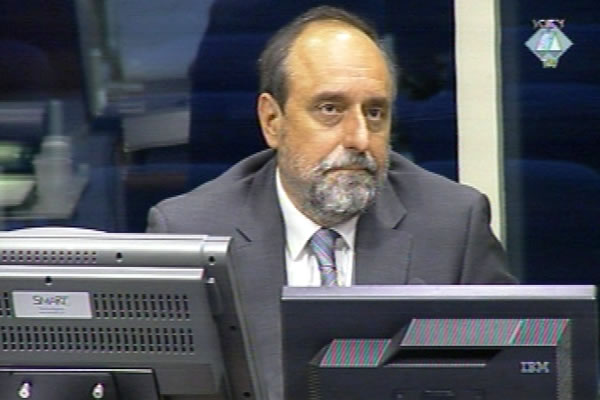Home
HADZIC’S ‘POLITICAL GAMES’
Former prime minister of the Serb Autonomous Region of Eastern Slavonia and president of the Republic of Serbian Krajina maintains that he ‘condemned every instance of injustice and all crimes’ he was aware of. Hadzic denied that he threatened Croats and called for their expulsion in his public appearances. As he explained, those were his ‘political games’ intended to foment conflict between ‘peaceful and aggressive Croats’
 Goran Hadzic testify in his own defence
Goran Hadzic testify in his own defence In the cross-examination of Goran Hadzic the prosecutor argued that ‘until now’ he had never heard Hadzic ‘publicly condemn’ the crimes against the non-Serbs in the Serb Autonomous Region of Eastern Slavonia and in the Republic of Serbian Krajina. During the conflict the accused held high political office in the two entities.
Hadzic replied that ‘from the moment I came to my senses’ he treated ‘Serbs and Croats equally’. He 'condemned every form of injustice as a matter of course’, Hadzic said. The accused reminded the prosecutor that in his opening statement he expressed his ‘deepest regret for the victims’. If the prosecutor wanted, Hadzic noted, he could be ‘even harsher’.
In the examination-in-chief Hadzic said that he didn’t interfere in the work of the police and the judiciary; they were supposed to prosecute those who committed crimes. This prompted the prosecutor to note that Hadzic ‘contributed’ to the administration of justice by ‘sitting passively and allowing others to do the job’. Hadzic repeated that in 1991 and 1992 he condemned ‘all crimes I was aware of’. As Hadzic explained, he felt as if those crimes had been perpetrated ‘personally against me and my family’. Hadzic admitted that he believed that he as politician was not in charge of implementing the laws, and that the relevant bodies should do it.
The prosecutor then quoted Hadzic’s interview to the Belgrade newspapers Politika in September 1991. In the interview Hadzic said that unlike the local Croats, those ‘Croats who come from Dalmatia and Zagorje are dangerous’. They know that ‘our goal is to send back’ the people who had come from BH duringPavelic’s reign. ‘If they resist, they know what will happen to them’, Hadzic concluded.
Commenting on that statement, Hadzic now said that it was his ‘political argument’. His intention was to cause a rift between ‘the peaceful and the aggressive Croats’. The prosecutor put it to Hadzic that by isolating one group he sent a signal to the others that they could do the same. Hadzic replied that he was not a ‘trained politician’. He expected his political career to last just a couple of months, Hadzic said, adding that he made statements ‘on the spur of the moment’ depending on the situation. Hadzic admitted that he ‘made a mistake’ because like him, ‘they were people who simply loved their ethnic community’.
In the interview in August 1991 Hadzic ‘urged Serbs to settle into empty Croat houses in Baranja and to change the demographic picture’ of that area. Hadzic claimed that it was not true. According to Hadzic, he thought it was a temporary measure, and he was addressing the Serbs expelled from Western Slavonia whose houses had beenburned down. In the same text Hadzic said that local Croats ‘never caused problems’ and ‘the evil is caused by the Croats from Herzegovina who converted 200 years ago’. ‘If it were up to me, my Serbs and the local Croats, the war would have never happened’, Hadzic said.
The prosecutor went on to note that in 1992 Hadzic also spoke about giving the ‘Croats from Herzegovina, Imotski and Zagorje’ tickets to go home. It was not‘a call for their expulsion’ but a ‘political game’ aimed at causing a rift between the two Croat fractions, Hadzic explained.
Goran Hadzic will continue his testimony after the Tribunal’s summer recess, on Tuesday, 19 August 2014.
Linked Reports
- Case : Hadzic
- 2014-07-23 DID PRIME MINISTER HADZIC HAVE ‘MINIMAL’ OR ‘SUBSTANTIAL’ POWERS?
- 2014-07-22 POLICY TO SEPARATE SERBS AND CROATS
- 2014-07-21 HADZIC’S AND ARKAN’S ‘CLOSE TIES’
- 2014-08-25 SERB MAJORITY ACHIEVED BY MAKING NON-SERBS LEAVE AND SETTLING SERBS
- 2014-08-26 HADZIC: POLITICAL UNTRUTHS ARE NOT LIES
- 2014-08-27 PRIORITIES SET BY HADZIC’S GOVERNMENT
